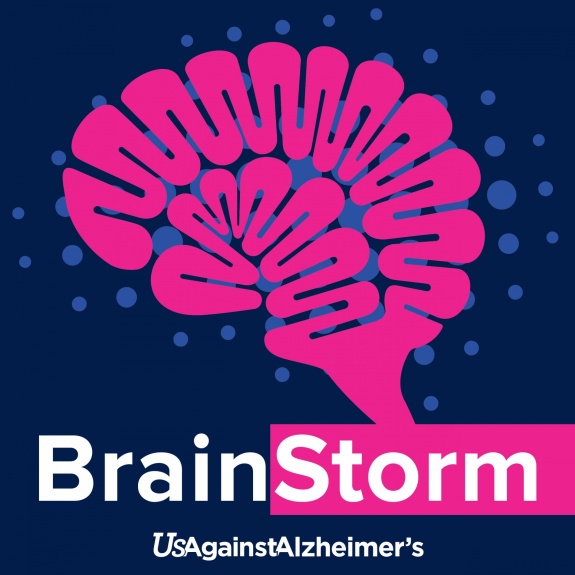Subscribe on your favorite player
Listen on Apple Podcasts Listen on Spotify Listen on Stitcher Listen on Google PodcastsBetter Support for Caregivers: Grace Whiting, National Alliance for Caregiving

About This Episode
Better Support for Caregivers
This special Alzheimer’s Talks was supported by Sunrise Senior Living and presented for Sunrise families, team members and community partners.
Being a caregiver—whether a friend, family member or paid professional—can be very demanding, particularly when caring for someone with Alzheimer’s or dementia. What resources are available that can lighten the burden of caregiving? Our guest speaker, Grace Whiting, President and CEO of the National Alliance for Caregiving, shared insights on existing and proposed resources to bring greater support to caregivers. Our guest moderator was Jill Lesser, a caregiver, UsAgainstAlzheimer’s board member and President of our WomenAgainstAlzheimer’s network.
Press the "Play" button under the image at left to hear the conversation.
RIta Altman, Senior Vice President of Memory Care and Program Services for Sunrise Senior Living, introduced the program. Regarding the partnership between Sunrise and UsAgainstAlzheimer's, she noted the Sunrise Fund for a Cure, launched in spring 2019. As of early October, it had raised $34,000 to fuel UsAgainstAlzheimer’s efforts in the fight against Alzheimer’s disease.
In her opening remarks, Grace Whiting observed that the term for a caregiver is somewhat fluid—caregiver, care partner, and caretaker—and that some people do not describe themselves with any of those terms. Also in flux: who is a caregiver? She said, “We think of a typical caregiver as a mid-career woman, caring for an older relative, and there are many women in that situation. But now we see more diversity. We think about caregiving as one size fits all, but there really is no typical care journey.” Caregivers can be older, age 75 and up. For those in smaller families or in rural areas, people outside the family are taking on caregiving roles. For millennial dementia caregivers, more balance exists between women and men, according to an analysis by UsAgainstAlzheimer’s and USC’s Roybal Institute on Aging.
Attitudes toward caregiving are also far from identical. Research by the Diverse Elders Coalition finds more isolation among African American, Asian American, Hispanic, Latino, LGBT, and Native American caregivers, and Latinos and Native Americans particularly feel an obligation to care for loved ones, which means not asking for help. The AARP-National Alliance for Caregiving study, Caregiving in America, finds that dementia caregivers are more likely to have help than other types of caregivers, but around 43% of those without help say they need it. Particularly vulnerable are spouses, who are less likely to share what's going on and, as a result, are more likely to have no help.
Ms. Whiting offered many suggestions for caregivers, to help manage the pressures of their role:
- Think about what’s reasonable to take on and who else may be able to help. Just as parents ponder what it means to be a good parent and how they measure up, caregivers should consider what it means to be a good child or a good spouse—and whether some of their responsibilities can be done by others. The Atlas of Caregiving, in partnership with the Family Caregiver Alliance, helps caregivers map everyone in a potential care circle, to find connections who can help, such as their faith community or workplace. Shared decision-making can also help—dividing up decisions that caregivers should make and those that others can make.
- Find meaningful ways to care for yourself. Often, caregivers neglect their own health, and standard advice (take a walk, smell a flower, pet a kitten) can underestimate the need. The Elder Care Locator finds local disability resource and senior centers, that offer evidence-based programs to help caregivers take care of themselves. The Rosalyn Carter Institute’s REACH program teaches dementia caregivers substantive ways to provide care without self-neglect.
- Do things together. Music therapy can engage those with dementia in their favorite songs, and caregivers can sing along. Exercise and cooking programs can help both stay healthy. Art museums offer days for those with dementia, and animal therapy can be an enjoyable relationship-builder. These activities can help caregiver and those with Alzheimer’s enjoy time together—or create ways for other family members to get involved.
- Find a sympathetic ear online. CareGiving.com has a strong forum for a range of needs, including life after caregiving. In the UsAgainstAlzheimer's Facebook community, caregivers and others affected by Alzheimer’s can share experiences in a safe place (membership is approved by volunteer moderators), and Facebook groups on hobbies or other topics can provide outlets to share feelings.
- Remember the real person. To help caregivers keep in mind what they love about the person they care for, an initiative called MemoryWell creates a life history of the person with dementia. This can help other care providers, too, to understand the person as an individual.
- Deciding between care at home or in a care facility. Before making this difficult decision, try a self-assessment. The American Medical Association’s caregiver self-assessment questionnaire gauges stress levels, which may help you see ways you can still help your loved one and ways you cannot anymore. A memory care center may be better equipped to provide the best care, and being around other residents can improve mood and engagement in those with Alzheimer’s. (Professional caregivers play a big part in Alzheimer’s care and also shoulder the burden of the disease. Tell these professionals when their care is appreciated, and acknowledge the difficulty of their work.)
- Become a caregiver-advocate. Advocacy is rewarding for many caregivers—pushing elected officials and others for changes to better support Alzheimer’s caregiving. To make a strong advocacy case, share your dementia caregiving story, plus data tying it to issues like its economic impact (which impacts employers when workers need time off and affects consumers through long-term care costs). Several recent policy developments have related to Alzheimer’s and caregiving: Congress passed the RAISE Family Caregivers Act, momentum is growing for paid family leave, and Medicare created reimbursement codes for doctors to provide care planning, so they can spend more time helping families make decisions about loved ones with dementia. Last, see this fact sheet about the CHANGE Act.
